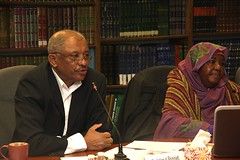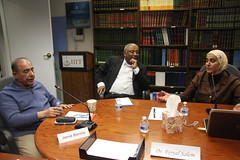On January 23rd, 2015, the International Institute of Islamic Thought (IIIT) commenced its Spring 2015 Lecture Series with an insightful presentation by Dr. Feryal Salem, of Hartford Seminary. The topic of her seminar was
“Reasons for Disagreements among Four Sunni Schools of Jurisprudence.”
Dr. Feryal Salem is Assistant Professor of Islamic Scriptures and Law and a Co-Director of the Islamic Chaplaincy Program at Hartford Seminary in Hartford, Conn. She has a Ph.D. in Islamic Studies from the University of Chicago and she has also received a number of ijazat from Syria, in addition to her degree in hadith sciences from the Nuriyya Hadith Institute of Damascus.
The program began with an introduction by Ermin Sinanović, Director of Research at IIIT, followed by Dr. Salem’s talk and a Question and Answer session.
Islamic Law during Prophet’s Life
Dr. Salem introduced her topic by discussing how Islamic law was derived at the time of Prophet Muhammad, peace and blessings be upon him. She cited Qur’anic evidence to show that the Prophet’s legislative authority was established in the revelation and that wahy was of two types: recited (Qur’an) and not recited (Sunnah).
She then gave examples of how the Qur’an, Sunnah and Ijtihad were utilized in the Prophet’s (pbuh) time. Since the Qur’an was revealed piecemeal, it became an interactive, dynamic text, providing a connection with Allah, which strengthened the early Muslim community. The companions had easy access to the Prophet (pbuh) and would simply ask him. Furthermore, the Sunnah was actually being recorded during the Prophet’s (pbuh) life, with ‘Amr ibn al-‘As as a known writer of hadith.
Dr. Salem defined Ijtihad as a way to expand Islamic rulings, based on analogy or reasoning, on matters where there is no clear ruling from the Qur’an and Sunnah. There are several instances from the Sirah where Ijtihad was clearly employed by the Prophet (pbuh) or his companions, such as during the Battle of Badr, the Battle of Trench, and when a group of companions went to Banu Qurayzah.
Through these examples, Dr. Salem emphasized that “in allowing for diversity, we stay united.” She explained that the Companions and the Prophet (pbuh) were comfortable with differences – it is we who feel discomfort today with ikhtilaf. “When we are grounded in our traditions, we don’t feel threatened by differences,” she declared.
Basis of Difference among Islamic Legal Scholars
The second part of Dr. Salem’s presentation was devoted to the major reasons why the four Sunni madhabs differ from each other. Some of these include variance in the reading (qira’at) of the Qur’an, doubt in the reliability of a hadith, difference of opinion in how a verse of the Qur’an is understood, and multiple meanings of words. She supported each one with examples of how scholars have reached rulings based on their separate interpretations, at times reaching a consensus and other times settling on different opinions. In doing so, she stressed that we must be aware that a lot of sophistication goes into this process and hence, it should be respected.
Ermin Sinanović provided concluding words at the session, explaining that in a binary world of 0’s and 1’s, it is difficult for the modern mind to comprehend that two apparently contradictory positions can both be acceptable. Yet, such one-dimensional thinking is not supported in Islam where there is plenty of flexibility and room to have multiples schools of thoughts. He, then, invited the audience to ask Dr. Salem questions, during which she highlighted the modern problem of taking religion from books without understanding the human element which has been such an integral part of Islamic traditions from the very beginning.
The seminar closed with a brief evaluation by Jamal Barzinji, President of IIIT.
 On Friday January 23rd, Dr. Amna Mohamed Al Faki, Professor of Pediatric & Child Health, Omdurman Islamic University - Sudan, presented a synopsis of her research on the heart as a cognitive organ and not just a pumping machine. She defined the human heart as “fundamentally a cognitive organ that processes thought, makes decisions, and interacts with the brain to produce conscious experiences”. She pointed out that the cognitive abilities of the human heart depend mainly upon i) the anatomical structures, ii) the intrinsic functions of cardiac ganglia, and iii) the intra-mural cardiac neurons. Her hypothesis -published in the Medical Hypotheses journal in 2010- suggests that the neurons in the muscular tissues of the heart have perceptive sensory functions locally in the heart like sensory neurons of the brain.
On Friday January 23rd, Dr. Amna Mohamed Al Faki, Professor of Pediatric & Child Health, Omdurman Islamic University - Sudan, presented a synopsis of her research on the heart as a cognitive organ and not just a pumping machine. She defined the human heart as “fundamentally a cognitive organ that processes thought, makes decisions, and interacts with the brain to produce conscious experiences”. She pointed out that the cognitive abilities of the human heart depend mainly upon i) the anatomical structures, ii) the intrinsic functions of cardiac ganglia, and iii) the intra-mural cardiac neurons. Her hypothesis -published in the Medical Hypotheses journal in 2010- suggests that the neurons in the muscular tissues of the heart have perceptive sensory functions locally in the heart like sensory neurons of the brain.